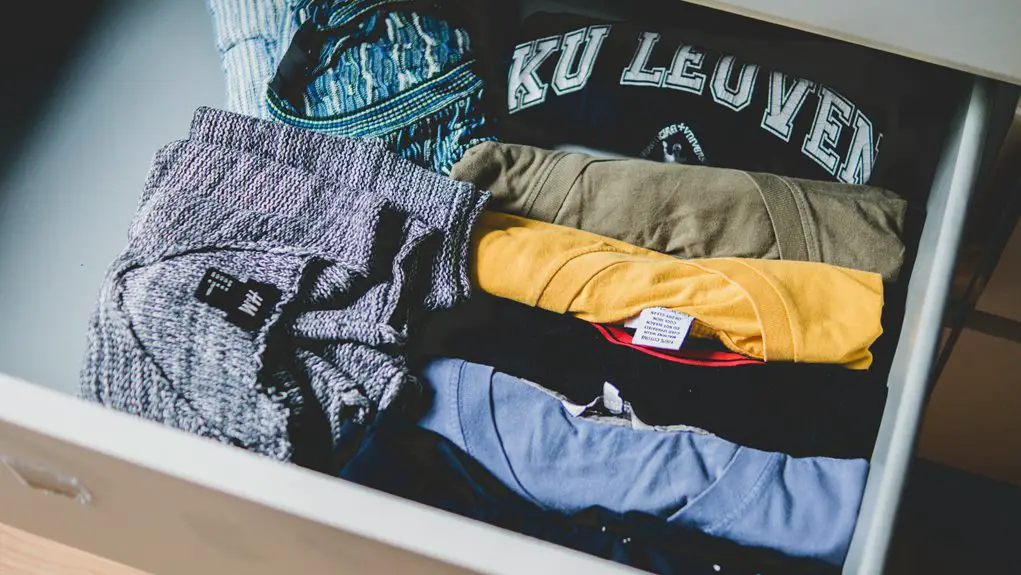For everyday t-shirts, consider cotton blends, polyester, bamboo fabric, modal, Tencel, and nylon. Cotton blends give you softness and durability, while polyester offers lightweight, quick-drying benefits. Bamboo fabric is eco-friendly and hypoallergenic, perfect for sensitive skin. Modal is incredibly soft and resists fading, and Tencel combines a silky feel with great breathability. Nylon adds strength and prevents pilling too. Want to know more about these fabrics and their advantages? Keep exploring!
Table of Contents
Key Takeaways
- Polyester is highly resistant to pilling, making it an excellent choice for durable t-shirts.
- Cotton blends maintain softness while resisting pilling, ideal for everyday wear.
- Modal is known for its resistance to pilling and fading, ensuring long-lasting wear.
- Tencel provides a silky texture and is durable, reducing the likelihood of pilling over time.
- Nylon is strong and prevents pilling, making it a reliable fabric option for t-shirts.
Cotton Blends
When you want the softness of cotton without the worry of pilling, cotton blends are a fantastic choice.
Cotton blends offer the softness you love without the hassle of pilling, making them a smart wardrobe choice.
These fabrics combine cotton with synthetic fibers, creating a durable yet comfortable material. You’ll find that cotton blends maintain their softness while resisting the annoying fuzz that often plagues pure cotton. This means you can enjoy your favorite t-shirts for longer without sacrificing comfort.
Additionally, cotton blends often provide improved breathability, making them ideal for everyday wear. Whether you’re lounging at home or out with friends, these fabrics keep you looking fresh.
Plus, they come in a variety of styles and colors, ensuring you’ll find the perfect shirt to match your personal style. Embrace the benefits of cotton blends for your wardrobe!
Polyester
Although some may overlook polyester for t-shirts, it offers exceptional durability and resistance to pilling that makes it a top choice. This synthetic fabric is lightweight, quick-drying, and retains its shape well, ensuring you stay comfortable throughout the day. Plus, polyester blends easily with other fabrics, enhancing both texture and performance.
Here’s a quick comparison of polyester and other popular fabrics:
| Fabric Type | Pilling Resistance |
|---|---|
| Polyester | High |
| Cotton | Medium |
| Wool | Low |
| Rayon | Medium |
| Linen | High |
Bamboo Fabric
Bamboo fabric is becoming a popular choice for t-shirts, thanks to its sustainability and eco-friendliness.
You’ll love how soft and comfortable it feels against your skin, making it perfect for everyday wear.
Plus, choosing bamboo helps support a more environmentally conscious wardrobe.
Sustainability and Eco-Friendliness
As the demand for sustainable fashion grows, many are turning to bamboo fabric for their t-shirt needs. Bamboo is a rapidly renewable resource that requires minimal water and no pesticides, making it an eco-friendly choice.
Unlike conventional cotton, which often depletes soil quality and water supplies, bamboo thrives in various environments without damaging ecosystems.
When you choose bamboo t-shirts, you’re supporting sustainable farming practices that benefit the planet. Additionally, the production process for bamboo fabric is less polluting compared to synthetic options.
Softness and Comfort Levels
When it comes to softness and comfort, bamboo fabric truly stands out among t-shirt materials. You’ll love how it feels against your skin—smooth, lightweight, and breathable.
Unlike some traditional fabrics, bamboo wicks moisture away, keeping you dry and comfortable throughout the day. This natural fiber also has a unique ability to regulate temperature, ensuring you stay cozy in both warm and cool conditions.
Plus, it’s hypoallergenic, making it an excellent choice if you have sensitive skin. You won’t have to worry about irritation or discomfort.
With bamboo, you get a luxurious feel without compromising on durability or style. Choosing bamboo t-shirts means embracing comfort without sacrificing your fashion sense. You’ll feel great wearing it, all day long!
Modal
Now let’s talk about modal fabric, a popular choice for T-shirts thanks to its softness and breathability.
You’ll appreciate its ability to resist pilling, making it a durable option for your wardrobe.
Plus, knowing how to care for modal can help maintain its quality for longer wear.
Modal Fabric Benefits
Although you mightn’t have heard much about modal fabric, it offers a range of benefits that make it an excellent choice for t-shirts. This luxurious material feels incredibly soft against your skin, making it perfect for all-day wear.
Plus, it’s breathable, ensuring you stay comfortable even on warmer days. Here are a few reasons to evaluate modal for your next t-shirt:
- Moisture-wicking: It keeps you dry by drawing sweat away from your body.
- Durability: Modal resists fading and holds its shape after multiple washes.
- Eco-friendly: It’s made from sustainable beech tree pulp, making it a greener choice.
- Hypoallergenic: It’s gentle on sensitive skin, reducing the risk of irritation.
Choosing modal means embracing comfort and sustainability!
Care Instructions for Modal
To keep your modal t-shirts looking their best, it’s crucial to follow specific care instructions.
Always wash your modal items in cold water on a gentle cycle to prevent damage. Avoid using bleach, as it can weaken the fibers.
When drying, opt for a low heat setting or hang them up to air dry; high heat can lead to shrinkage and loss of softness. If you need to iron, use a low-temperature setting to avoid scorching.
It’s also best to wash your modal shirts with similar fabrics to minimize friction, which can cause pilling.
Tencel
When you’re on the hunt for fabrics that resist pilling, Tencel stands out as a top choice. This eco-friendly fiber, made from sustainably sourced wood pulp, offers a luxurious feel that elevates your everyday t-shirt experience.
Here’s why you’ll love Tencel:
- Softness: Its silky texture feels incredible against your skin, making it perfect for all-day wear.
- Breathability: Tencel’s moisture-wicking properties keep you cool, ensuring comfort during warm days.
- Durability: Unlike other fabrics, Tencel holds up well against wear and tear, maintaining its original beauty.
- Eco-Friendly: Choosing Tencel means you’re supporting sustainable practices, helping the planet while looking good!
With Tencel, you’re investing in comfort and style that lasts.
Nylon
If you’re looking for another fabric that resists pilling, nylon is a fantastic option. This synthetic material is known for its durability and strength, making it perfect for everyday t-shirts.
Nylon’s smooth texture not only feels great against your skin but also helps prevent those annoying little balls of fluff from forming.
You’ll appreciate how lightweight and breathable nylon is, ensuring comfort through any activity. Plus, its moisture-wicking properties keep you dry during hot days or workouts.
When it comes to care, nylon is easy to wash and quick to dry, making it a practical choice for busy lifestyles.
Frequently Asked Questions
What Are the Benefits of Non-Pilling Fabrics for T-Shirts?
Non-pilling fabrics keep your t-shirts looking fresh and new longer. You’ll enjoy a smoother appearance, less irritation on your skin, and increased durability, making your wardrobe more reliable for everyday wear and easy maintenance.
How Do I Care for Non-Pilling Fabrics?
Caring for non-pilling fabrics requires careful consideration. Keep it cool—wash in cold water, gentle cycle. Avoid abrasive materials, and don’t over-dry. Instead, air-dry your favorites to maintain their fabulous feel and finish.
Are Non-Pilling Fabrics More Expensive Than Regular Fabrics?
Non-pilling fabrics usually cost a bit more than regular ones, but you’re investing in quality and durability. They’ll last longer and maintain their appearance, saving you money in the long run on replacements.
Can Non-Pilling Fabrics Be Eco-Friendly?
Yes, non-pilling fabrics can be eco-friendly. You’ll find options made from organic cotton, recycled materials, or sustainable fibers. These choices not only resist pilling but also support environmental health, ensuring you feel good wearing them.
How Do I Identify Non-Pilling Fabrics When Shopping?
When you’re shopping, check fabric labels for terms like “microfiber” or “polyester blends.” Feel the texture; smoother fabrics tend to resist pilling. Also, look for tightly woven materials, as they’re less likely to pill.
- A Profile of Epyllion Fabrics Ltd: A Leader in Bangladeshi Textiles - June 21, 2025
- Price Analysis of Non-Woven Fabric Bags in Bangladesh - June 21, 2025
- Exploring the Market for Organic Cotton Fabric in Bangladesh - June 21, 2025






